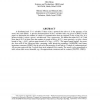Free Online Productivity Tools
i2Speak
i2Symbol
i2OCR
iTex2Img
iWeb2Print
iWeb2Shot
i2Type
iPdf2Split
iPdf2Merge
i2Bopomofo
i2Arabic
i2Style
i2Image
i2PDF
iLatex2Rtf
Sci2ools
105
click to vote
WDAG
1990
Springer
1990
Springer
Tight Bounds on the Round Complexity of Distributed 1-Solvable Tasks
A distributed task T is 1-solvable if there exists a protocol that solves it in the presence of (at most) one crash failure. A precise characterization of the 1-solvable tasks was given in [BMZ]. In this paper we determine the number of rounds of communication that are required, in the worst case, by a protocol which 1-solves a given 1-solvable task T for n processors. We define the radius R (T) of T, and show that if R (T) is finite, then the number of rounds is (logn R (T) ); more precisely, we give a lower bound of log(n -1)R (T), and an upper bound of 2+ log(n -1)R (T) . The upper bound implies, for example, that each of the following tasks: renaming, order preserving renaming ([ABDKPR]) and binary monotone consensus ([BMZ]) can be solved in the presence of one fault in 3 rounds of communications. All previous protocols that 1-solved these tasks required (n) rounds. The result is also generalized to tasks whose radii are not bounded, e.g., the approximate consensus and its variant...
Related Content
| Added | 11 Aug 2010 |
| Updated | 11 Aug 2010 |
| Type | Conference |
| Year | 1990 |
| Where | WDAG |
| Authors | Ofer Biran, Shlomo Moran, Shmuel Zaks |
Comments (0)

